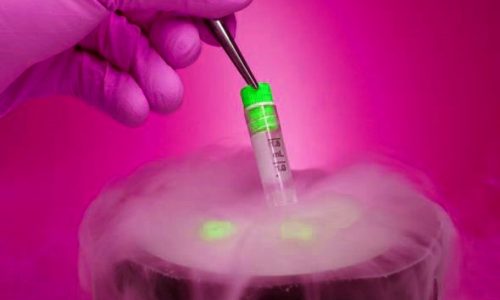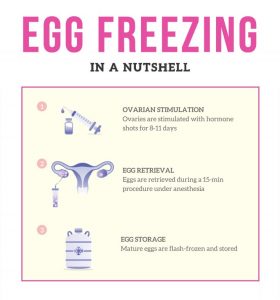Best Cryopreservation Treatment in Ahmedabad
If you are not ready for pregnancy yet and want to keep the option open for the future, you can think of Cryopreservation.
Also, if you are undergoing IVF treatment or having failed IVF cycle, then cryopreservation can significantly help you to overcome infertility issues.
If you are considering oocyte, sperms or embryo Cryopreservation, then visit us at Nisha IVF Centre. We provide reliable, cost-efficient and best Cryopreservation Treatment in Ahmedabad.
What is Cryopreservation?
The cryopreservation technique has been in use for decades in many medical branches. Cryopreservation means freezing of biological material at super-low temperatures as -196°C/-321°F in liquid nitrogen. It stops all the cellular activities entirely. Even it ceases the biochemical reactions that cause DNA degradation and cell death.
The cryopreservation technique helps in the freezing and thawing of the eggs, sperms, or embryos that can be used in the IVF treatment. Also, we can use the frozen sperms in the IUI procedure.

Cryopreservation of Eggs, Sperms or Embryos:
1. Oocyte Cryopreservation or Egg Freezing
Oocyte cryopreservation allows using frozen eggs at any desired time later in the future. When you are ready for pregnancy, you can use these preserved eggs to achieve conception.
Benefits:
- Reduces risks of chromosomal deformities that may increase with age, especially when you are 35 or older.
- After the IVF cycle, you can also cryopreserve the leftover eggs for future use.
- You can also wish to donate the frozen eggs to other women who are struggling to conceive.
- Suppose you are undergoing medical treatment like cancer therapy which may hamper your ability to produce eggs. Then you can choose oocyte cryopreservation to save your eggs.
Procedure:
Oocyte cryopreservation has the following steps.
Ovarian stimulation
Our doctor will give medications to stimulate your ovaries to produce many eggs.
- Egg retrieval
First, we retrieve the eggs under sedation. Usually, our specialist inserts a transvaginal ultrasound probe into the vagina to find the follicles. Then, places a needle to remove the eggs from the follicles. Our experts retrieve approx. 10 or more eggs per cycle. You may experience slight discomfort and cramping after the process.
- Freezing
Retrieved eggs are then collected and cooled to a sub-zero temperature to preserve them for later use.


2. Sperm Cryopreservation or Sperm freezing
Sperm cryopreservation is a technique of storing sperms for future use.
Benefits:
- It helps men to conserve their fertility who is about to have a clinical procedure such as chemotherapy, prostate or testicular surgery that may cause infertility.
- If you are under the risk of exposure to chemicals or radiation, then you can opt for sperm cryopreservation.
- We can also utilize the cryopreservation procedure in sperm banking.
Procedure:
- The male partner provides the semen sample.
- Next, our technicians analyze the sperm quantity and quality.
- Then, we freeze the high-quality sperms for further use.
3. Embryo Cryopreservation
In IVF, embryo cryopreservation is an excellent option for preserving fertility for future use.
Benefits:
- Embryo cryopreservation provides you with another chance to get pregnant if the first IVF cycle fails. So, you don’t need to repeat the whole IVF procedure.
- It also helps to maintain the fertility of women who are not ready for pregnancy and want to concentrate on their career or higher education.
- You can also choose to donate frozen embryos to infertile couples.
Procedure:
- Our specialist will give medications to the woman to induce the release of eggs.
- Further, we combine the retrieved eggs with the sperms to allow fertilization.
- The fertilized eggs or embryos are frozen three to five days after fertilization.

Why choose us?
- Nisha IVF Centre is among the best fertility centres in Ahmedabad. We are one of its kind IVF Centre that provides cost-efficient IVF and other fertility services with world-class technology.
- Nisha IVF Centre is headed and operated by a team of experienced and skilled gynaecologists and IVF doctor in Ahmedabad like Dr Nisarg Patel, Dr H. B. Patel and Dr Himali Maniar Patel.
- For most of our patients, we have successfully achieved positive results in the first IVF cycle.
- Apart from conventional assisted reproductive techniques (ART), we provide advanced ART, such as IUI, IVF, ICSI, Cryopreservation, Oocyte Donation, Blastocyst transfer, Embryo Screening, etc.
- We execute fertility treatments using the latest techniques that minimize the risk and time of the procedure.
- Nisha IVF Centre has state-of-the-art technology with ultra-modern operation theatres and IVF station. We ensure our centre is on par with the hygiene and sanitation rules as deemed essential for any healthcare organization.
If you are considering cryopreservation, there are several other factors you need to take into attention. To know whether cryopreservation is suitable for you, our experts may suggest that you initially do a fertility test to find your fertility factors.
Looking for an IVF Treatment?
Fill Out the Form Below for an instant Appointment with the Doctor
Frequently Asked Questions
Cryopreservation and IVF are usually considered safe techniques. Many research studies have revealed that cryopreservation of eggs, sperms or embryos doesn’t show any adverse effects. Children born with cryopreserved eggs, sperms, or embryos do not carry any congenital disability.
The average age at which women freeze their eggs is around 37. Many women freeze their eggs in the late 30s and early 40s. For healthier pregnancy in the future, it is best to freeze your eggs before you are 36.
The standard storage period for embryos usually is ten years. However, women, in some instances, can store their embryos for up to 55 years of their age.


